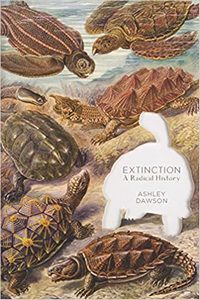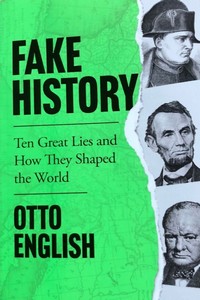Book reviews – Dawson, English, Michaels/Reed
 Radical Enough?
Radical Enough?
Extinction. A Radical History. By Ashley Dawson. OR Books. 2022. 171pp.
In this expanded edition of a book first published in 2016, Ashley Dawson provides an excellent and accessible analysis of how human beings have tended to use and abuse the biosphere over the whole of their history and how in particular this has accelerated and come to a critical head in the last 200 years. He compellingly outlines to us how, in this most recent period, the capitalist system with its relentless drive for economic growth and profit has swiftly taken over the planet and increasingly devastated both its flora and fauna without thought of balanced development or survival of the natural world. The result, the author argues, is that the process of extinction has been speeded up to the point that it may be impossible to stop it happening. A prime example he cites is the catastrophic insect population crash in the economically advanced world over the last few decades which is having dire knock-on effects for animal survival as a whole and for the entire natural environment. Another is the halving of the number of wild animals in the world over the last 40 years, elimination of them now running at the rate of a hundred species a day. ‘Viewed in terms of sheer quantity’, as he puts it, ‘life on this planet is being liquidated at unprecedented rates’. He leaves us in no doubt about how capitalism’s quest for continuous growth is stripping ‘the world of its diversity and fecundity …thereby threatening the planetary environment as a whole’.
The stark choice we face, according to the author, is what he calls ‘radical political transformation or deepening mass extinction’. But what does this transformation consist of? Not, he tells us, so-called ‘green capitalism’, whereby the current system seeks to reform itself via ‘conservation’ measures of one kind or another. Such measures, we are told ‘can never be more than a paltry bandage over a gaping wound’. In this he aligns with the trenchant argument against ‘deep green’ reforms to be found in the recently published Bright Green Lies which states: ‘Instead of a movement to save the planet, we have a movement to continue its destruction’ (reviewed in our January issue – bit.ly/3KXoLdU). And since, he goes on, nothing in human nature prevents people cooperating to bring in a society based on ‘genuine social connection and engagement’, we can transform society so as to remove capitalism’s pressure on people (both workers and capitalists) to compete with one another, thereby exerting impossible pressure on the environment. He delves too into how the ceaseless race for accumulation and expansion as capitalists and their countries are set against one another in the drive to produce endless commodities not only leads to ruination of the environment but also brings never-ending military conflict and physical destruction and displacement of people (‘capital’s death-dealing reign’, as the author calls it).
All fine and incontrovertible so far. But what must be called into question is the actual content of the ‘radical political transformation’ that is proposed. Having kicked out the idea of a conservation programme within capitalism to rescue the environment, the author calls for ‘a program of degrowth for the Global North’ with the aim of somehow benefitting workers in the poorer countries of the capitalist world (‘the Global South). The unfortunate implication here is that workers in the advanced capitalist countries are already doing well enough. And there is also a prescription that ‘the rich in Global South countries must rein in their consumption’. But how all this is going to happen we are not told. Not, presumably, by a majority of the world’s workers taking democratic political action to transform the system of buying and selling, money and wages into a different system of voluntary cooperation for production and distribution and free access to all goods and services on a global level, something that is never mentioned. Instead the author recommends a ‘financial transactions tax of the type proposed by James Tobin’ (a ‘Robin Hood tax’), which we are told, would ‘generate billions of dollars to help people conserve hotspots of global diversity’. And, of course, there is that old chestnut of those advocating reform of capitalism – universal basic income (here called ‘universal guaranteed income’). These are all of course fine thoughts, but, coming after an all-out, fully justified and admirably argued attack on capitalism and its workings, what we have in effect is not a proposal to dispense with the system of buying and selling (which is what capitalism is), but ways of trying to make it work in a different, more benign way. And this after being assured that capitalism can’t be reformed, since its very nature is antithetical to human and environmental wellbeing and must be got rid of.
Right at the end of this book, in musing on what kind of end we wish capitalism to have, the author states: ‘Capitalism is not eternal; it is a specific economic system grounded in a set of historically particular economic arrangements and social values’. This, as much else in this book, is undeniable, but if there is to be an end to capitalism, as we fervently hope there will be, it cannot be via reforms or rearrangements – no matter how well intended – of its details or its organisation. It really does need to be made extinct – 100 percent.
HKM
 Fake History
Fake History
Fake History: Ten Great Lies and How They Shaped The World. By Otto English, Wellbeck, 2022
Anyone who has seen a big enough expanse of water will be able to see the curvature of the Earth on the horizon. The bizarre notion that pre-Colombian people thought the earth was flat was started by Washington Irving, author of Sleepy Hollow, the Rip Van Winkle stories and a biography of Columbus published in 1828. According to Irving, Columbus sailed west from Spain to prove that the Earth was spherical and ‘discovered’ America in the process. However, there is no evidence that Columbus had that intention and there were already, in 1492, some 60 million people living in America. The founding myth of America and many other states is that of ‘exceptionalism’, the belief that they are a special people and, by inference, that others are inferior.
Abraham Lincoln did not believe that all men were created equal. In 1861 Lincoln became the first Republican Party President. Shortly afterwards a Civil War began which killed an estimated 618,000 people (a greater number than British dead, military and civilian, in the Second World War). In his Gettysburg Address of 1863 Lincoln declared that the American nation was founded on the proposition that ‘all men are created equal’. What he meant was ‘all white men’. In a debate in 1858 Lincoln said that he was ‘not, nor have ever been, in favour of bringing about in any way the social and political equality of the white and black races’. He was opposed to ‘mixed race’ marriages but he was strongly in favour of ‘repatriating’ black people to Africa. He didn’t believe black people should have the vote, though he did eventually agree to extending suffrage to black Americans who had served on the Union side in the Civil War. But not to other black Americans.
Queen Victoria married a German, Prince Albert of Saxe-Coburg Gotha, in 1840. They continued with that family name, Saxe-Coburg Gotha, until the First World War with Germany, when overnight it became the House of Windsor. The insinuation has long been held that the royal family is German. This is rather like Donald Trump’s accusation that Barack Obama couldn’t be a ‘real American’ because he wasn’t born in America and his father was born in Kenya. Barack was born in America and his father was born in Kenya, but that didn’t matter to the racist meme. The arch-opponent of immigration Nigel Farage is the great-great grandson of German refugees in the 1860s. He may be a hypocrite, but it would be absurd to claim that he is really a German.
There was never a realistic prospect of Nazi Germany invading Britain during the Second World War. Although their air forces were more or less evenly matched, the Kriegsmarine was massively outgunned by the Royal Navy. That alone made invasion extremely unlikely. German General Alfred Jodl said that an invasion would be like ‘sending troops into a mincing machine’. And Field Marshal von Rundstedt later claimed that Hitler never had a serious plan to invade. But that doesn’t stop the relentless propaganda being pumped out that Britain could have lost the war if not for those who gave their lives in its defence.
Many falsehoods have been told by and about Churchill, some of which have been repeated by his biographer and wannabe Churchillian PM, Andrew Boris de Pfeffel Johnson. Among the many things Churchill never actually said: ‘If you’re not a Liberal by 25 you don’t have a heart’ and that ‘if you’re not a Conservative by 35, you don’t have a brain’ (he was a Conservative MP at 25 and a Liberal MP at 35). Born into the ruling class, Churchill’s reputation was forged when he became Prime Minister of the wartime coalition in 1940. Like Abraham Lincoln, he has acquired a cult status, seemingly beyond criticism. But his defence of Empire is less well known. For instance, writing in the 1930s of aborigines in Australia: ‘I do not admit that a wrong has been done to these people by the fact that a stronger race, a higher-grade race, a more worldly-wise race to put it that way, has come in and taken their place’. How much longer will his statue remain in Parliament Square? Upon hearing of a suggestion to remove the statue, Boris Johnson said that he would ‘fight with every breath in his body’ to keep the statue up. A more likely scenario would be — taking a cue from his hero — that he would give the order for others to do the fighting.
And there’s much more fake history exposed in this recommended book by Otto English. Some hostile reviewers have gleefully seized upon the fact that this name is fake. His real name is Andrew Scott, which is also the name of an actor. To avoid confusion, and possible legal consequences, he adopted a pen name. Nothing unusual about that for authors.
LEW
 Missing Class
Missing Class
No Politics But Class Politics. By Walter Benn Michaels and Adolph Reed, Jr. Edited by Anton Jäger and Daniel Zamora. Eris £20.
This volume consists of a number of essays written individually by the two authors over the period from 1997 to 2020, together with a foreword by the editors and a conclusion by the authors. There are also four interviews of the authors, conducted by the editors.
The main argument presented is that focus on inequality in terms of ‘race’ distracts attention from the more general inequality that exists. As economic inequality in general increases, so (it seems) does the enthusiasm for addressing every non-economic kind of inequality. The US is less racist, sexist and homophobic than it was several decades ago, but it is also more unequal. Neoliberalism, the dominant capitalist ideology, is opposed to discrimination but perfectly happy with economic inequality. Equality of opportunity, while good for business, justifies inequality. Equality of race and gender is in no way contradictory to inequality of class.
Most white people are badly off, with sixty million white Americans having basically no wealth at all. Would it really benefit black people if roughly one in eight of the top one per cent were black, in keeping with the proportion of black people in the whole population? Gains for a few do not help the many, but are part of a system that hurts the many. Universities have become more diverse as far as students are concerned, though Latinos and Latinas are underrepresented, and poorer students struggle to get accepted. Professors are also more diversified, but increasingly teaching is being done by people who do not have full-time or ‘permanent’ contracts (adjunct faculty, as they are known). Adjunct staff are not so diversified, but the problem lies really in their low pay and poor working conditions.
The authors are of course not against resistance to discrimination in terms of ‘race’ or gender, and they give a good account of racism; rather, they see this as less fundamental than struggle against inequality and for a world where nobody lives below the poverty line. The problem with the book, however, is that not much at all is said about the class politics mentioned in the title, in terms of what the classes are or what its aim should be. There are a number of vague references to particular classes, such as ‘the black professional-managerial class’, an ‘upper-class professor’ and an ‘upper middle class’, and to the one percent. It is all very well saying that ‘class matters more than race or sex’ (in the context of personal care aides, who are very badly paid and are mostly women of colour), but more needs to be said in terms of how class is defined and what classes exist under capitalism. As is said, fighting exploitation is a way of fighting the effects of discrimination, but fighting discrimination is not a way of fighting exploitation: ‘if nobody were the victim of racism or sexism, lots of people would still be poor’. A reference to Marx’s solution of abolishing (private) property is not enough to show the kind of system the authors stand for.
So an interesting text, though it does not quite deliver what might be expected.
PB
Next article: 50 Years Ago – Eysenck at the LSE / Fitton for purpose ⮞
2 Replies to “Book reviews – Dawson, English, Michaels/Reed”
Leave a Reply
You must be logged in to post a comment.

Re: Extinction. A Radical History
Here’s a great article about financial transaction taxes, by Comrade Buick.
It’s from an equally great issue of the ‘Standard (December 2001), that deals with anti-globalistation.
https://www.worldsocialism.org/spgb/socialist-standard/2000s/2001/no-1169-december-2001/
Whoops. Wrong link. Here’s the right one:
https://www.worldsocialism.org/spgb/socialist-standard/2000s/2001/no-1169-december-2001/tobin-tax-what-joke/